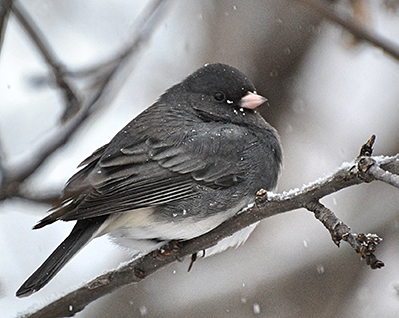
Every year, as the days grow shorter and the nights get colder, it amazes me how animals can survive the winters we have here. Although weather conditions are changing, the main elements needed for survival remain the same for all animals, including birds.
In the winter there are three major things birds need for survival: food, water, and shelter. Some birds, like chickadees, nuthatches, jays, and woodpeckers will cache food away throughout the year to survive the winter. Other birds, such as cardinals, doves, and finches, do not. All birds must rely on finding food in the winter to survive. Seeds, nuts, fruit, and dormant insects and larvae are major sources of food for birds in the winter. Although birds will visit feeders in the winter, the food they get from it is just a supplement of what they find naturally. Providing highfat foods like peanuts, suet, sunflower, and nyjer seed give birds the calories they need to stay plump and warm in the winter.
Finding water can be a challenge in the winter. It’s not uncommon to see birds drinking from melting icicles to get some water! Shallow bodies of water that birds can bathe in and drink from can be hard to find in the winter. Providing birds with a heated birdbath will give them that source of water all winter long. These sources of water are extremely important though, because birds will use them to clean their feathers. Clean feathers allow birds to trap air between their warm body and feathers, providing insulation. This is why you so often see fluffed up birds in the winter! They’re using their down coats to keep warm.
Birds find shelter in many places. Shrubs, trees, tree cavities, and man-made structures are all places birds will go to stay out of the elements. Roosting pockets are great for birds to take refuge in during harsh weather conditions. These woven pockets are not designed for nesting, but to provide birds with a place to stay out of the snow, rain, and wind. Roosting houses are even bigger and have perches inside of them for multiple birds to sit on while they take shelter. Multiple species will use roosting houses and pockets at the same time. If you keep your birdhouses out all year you may see birds flying in and out of them in the cold months. They provide a space for the bird to hunker down and rest. Don’t be surprised if you see something furry in your nest box! Mice, and if the box is big enough, squirrels will also use them to stay out of the elements. At night in the winter many birds undergo a process called “torpor.” Their body temperature drops, their metabolism slows down, and their physiological functions slow down. It is almost like a mini hibernation. Their body doesn’t use as many resources as they would normally need when they are in this state. This does make the animal very susceptible to predators however, so providing places for the birds to roost is important!
This time of year be on the lookout for new birds in your yard. Dark-eyed juncos are here only in the winter and early spring. They are dark gray with a white belly and pink beak. Look for them hopping on the ground under your birdfeeders. White-crowned and white-throated sparrows may also visit your yard this time of year. They both have white stripes on their heads but the white-throated sparrows also have a white patch on their throat. They are also most often seen on the ground foraging under feeders. Pine siskins and the occasional redpoll may come to your nyjer feeders. Pine siskins look similar in size to goldfinches, but they are very striped. Redpolls are small chickadee-sized birds that have a raspberry colored mark on the top of their heads. Some years there are huge influxes of these birds, other years they are scarce.
It is amazing how many birds you can get in your yard throughout the winter by providing them with their main staples for survival: food, water and shelter. There is nothing more beautiful than a tree full of cardinals on a snowy winter’s day. Entice them and our other hardy winter birds with some creature comforts and you will have beautiful birds all season!
Liz Magnanti is the manager of the Bird House in Pittsford.
Views: 3






